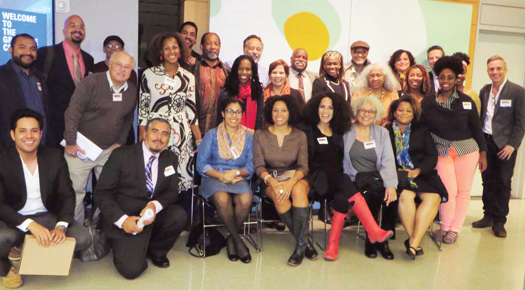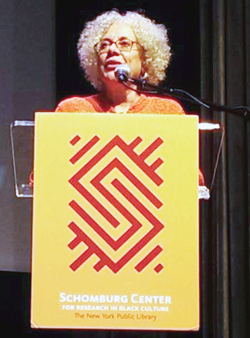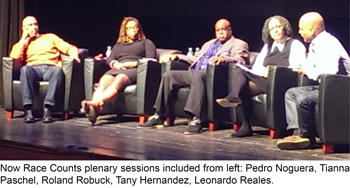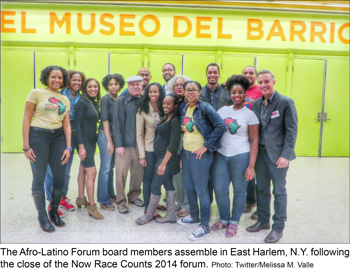Afro-Latinos want to be recognized as Black
By Saeed Shabazz -Staff Writer- | Last updated: Nov 6, 2014 - 8:51:17 AMWhat's your opinion on this article?
Related news:
The Secret Relations Between Blacks and Mexicans (FCN, 05-28-2014)
Don’t be fooled: Latino = Indigenous (FCN, 05-01-2014)
Keeping Black culture alive in Brazil (FCN, 12-11-2009)
Afro-Latino Heritage Must be Highlighted (FCN, 10-23-2009)
The Basis Of Black-Latino Unity Is Not Political (BEC, 07-24-2001)
Who is Black? (Rosa Clemente, 07-10-2001)

Afro-Latino participants attended a two-day forum. Many Afro-Latinos want to be counted in the U.S. Census as Black. Photos: Twitter/afrolatin@forum
|
NEW YORK (FinalCall.com) - Scholars, activists and cultural representatives from Latino grassroots organizations gathered here for the three-day AfroLatin@Forum to express solidarity and their continued fight for their Black identity.

Miriam Jimenez Roman opens the Now Race Counts 2014 Forum at the Schomburg Center in New York to discuss issues of race and solidarity.
|
Prof. Juan Flores, who teaches Social and Cultural Analysis and directs Latino Studies at New York University, is a co-founder of the forum. The forum provides a “unique” opportunity to examine structural and ideological barriers to full Afro-Latino representation, he said.
Discussions during the forum questioned the Black-Brown divide and proposed a unified agenda to deal with the racism against Black Latinos and cultural discrimination, he said. That is why the forum’s theme was “Now Race Counts,” Prof Flores added.
The group literally wants the way Afro-Latinos are counted in the U.S. Census to change to reflect their race and not just their country of origin. Part of the reason is to remove the stigma from having a Black identity and combat the undercounting for Afro-Latinos which the group sees as a longstanding problem.
According to Prof. Flores, the forum has alerted the Census Bureau to a movement that challenges how the agency counts Afro-Latinos as Hispanics.

|
Prof. Telles, who teaches courses in race and ethnicity with a special emphasis on Latin America and Latinos in the U.S., said Hispanics can identify as White, Black or something else. “However, most Hispanics choose White or other as their race. When asked to write in what ‘other’ they generally write in their national group (such as Dominican, Mexican, or Puerto Rican),” said the author of a new book, “Pigmentracities: Ethnicity, Race and Color in Latin America.”
The Final Call contacted the Census Bureau to ask if the agency was aware of the Afro-Latino identity question. Adria Thomas, a Census Bureau public affairs specialist, referred to two agency documents to answer any questions about Afro-Latinos and how they are counted.
The first document was 141-pages entitled “Comparative Ethnographic Studies of Enumeration Methods and Coverage across Race and Ethnic Group.” The second was the press release “Census Bureau Host 2020 Census Operations Update.”
The Census Bureau concluded that there needs to be a further test on combined race and Hispanic origin questions. “Various articles and blogs support or argue against the use of combined or separate race and ethnicity questions,” the agency noted.
The Census Bureau said it would be facing off with Latino activists concerned about an undercount if Afro-Latinos are in some way separated from the overall Hispanic group.

|
“That is the basis for our argument, that this isn’t just a spiritual and cultural movement; it is a policy related advocacy,” said Prof. Flores. He and others believe that Afro-Latinos are not counted or severely undercounted in the Western Hemisphere and that contributes to problems.
“Throughout the Americas, Afro-Latinos are subject to severe systemic invisibility at all levels of society. In public and private institutions and agencies as well as in the general discourse on race and ethnicity,” said the call for the forum.
Analysts said African descendants are well over a third of the total population in Latin America and 50 percent of those living in poverty. However, in the U.S. less than three percent of Latinos identify as Black. “That is why this population falls between the cracks,” said Prof. Flores.
“Very few people select Black, even Dominicans, who are often perceived as Black in the U.S.,” said Prof. Telles. “This is probably related to the fact that in Latin America, Black is an especially stigmatized category.”
Josue Perea, a forum participant and Afro-Latino activist in New York, said, “We wanted to highlight how race counts and that has been our objective since the first conference in 2011. The Afro-Latino@Forum gives us the visibility needed to deal with our vast diversity,” he said. The gathering was held Oct. 23-25.
We recognize that the Census Bureau wants to completely erase our diversity by lumping us into one group, Mr. Perea said. “We actually want to be recognized as Black,” he added.
INSIDE STORIES AND REVIEWS
-
-
About Harriett ... and the Negro Hollywood Road Show
By Rabiah Muhammad, Guest Columnist » Full Story -
Skepticism greets Jay-Z, NFL talk of inspiring change
By Bryan 18X Crawford and Richard B. Muhammad The Final Call Newspaper @TheFinalCall » Full Story -
The painful problem of Black girls and suicide
By Charlene Muhammad -National Correspondent- » Full Story -
Exploitation of Innocence - Report: Perceptions, policies hurting Black girls
By Charlene Muhammad -National Correspondent- » Full Story -
Big Ballin: Big ideas fuel a father’s Big Baller Brand and brash business sense
By Bryan Crawford -Contributing Writer- » Full Story






 Click Here Stay Connected!
Click Here Stay Connected!








